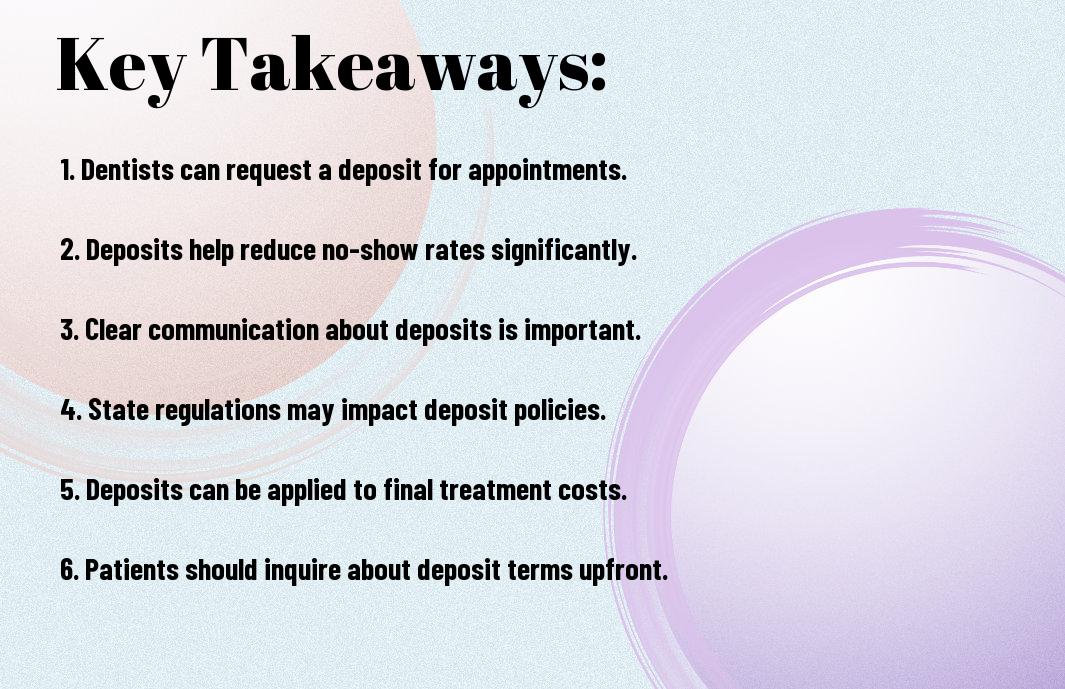There’s a growing trend in dental practices where you may encounter requests for a deposit before receiving certain treatments. This practice can vary by dentist and procedure, often implemented to secure your appointment and cover costs for significant services. Understanding the reasons behind these deposits can help you navigate your dental care effectively. For insights on the topic, you can check out this discussion on Deposits for big treatment : r/Dentistry.
Key Takeaways:
- Deposits may be required for certain dental procedures, especially those that require significant time or resources.
- Policies regarding deposits can vary widely between dental practices, so it’s important to check ahead.
- Patient agreements may outline the conditions under which deposits are collected, including cancellation policies.
- Insurance coverage typically does not apply to deposits, meaning patients should be prepared for out-of-pocket costs.
- Transparency about fees and deposits is key for maintaining positive patient relationships and trust.

Understanding Deposits in Dentistry
To navigate the financial aspects of dental care, it’s necessary to understand the role of deposits in the industry. Many dental practices require a deposit as a part of their payment structure, which can reflect the commitment between the patient and the provider. This section will clarify what deposits mean specifically within the context of dentistry and their importance in scheduling and treatment processes.
Definition of a Deposit
On a fundamental level, a deposit is a sum of money that you pay in advance to secure a service or appointment. In dental practices, this deposit acts as a commitment from you as a patient, indicating that you take your scheduled appointment seriously and intend to follow through with the necessary treatment.
Purpose of Charging Deposits
Between managing their schedules and resources, dental practices use deposits to ensure that you are serious about attending your appointments. By charging a deposit, your dentist can minimize missed appointments, which can lead to wasted time and resources. This practice also helps safeguard their practice against last-minute cancellations that can adversely impact their waiting list.
Charging a deposit allows for better management of appointment scheduling, ensuring that time slots are utilized effectively. It creates a system that benefits both you and the dental practice, as it promotes accountability and reduces the likelihood of postponed or canceled visits. Additionally, your deposit often goes toward the overall cost of your treatment, making it a valuable part of the financial process in your dental care journey.
Legal Considerations
Now, when it comes to whether dentists can charge a deposit, there are various legal considerations to take into account. Deposits could be seen as a commitment from patients, which helps practices secure their schedules and manage cancellations. However, it is imperative that you understand the laws surrounding such practices in your state, as they can vary significantly and may require specific disclosures or agreements.
State Regulations
Among the factors influencing a dentist’s ability to charge a deposit are state regulations that govern dental practices. Each state has its own set of rules regarding patient agreements and financial practices, which can dictate what fees are permissible and how they should be communicated to you as a patient.
Ethical Guidelines
For dentists, adhering to ethical guidelines is just as important as following legal regulations when deciding to charge a deposit. These guidelines emphasize the importance of clear communication and transparency in financial matters, ensuring that you fully understand any financial commitments before agreeing to them.
Further, ethical guidelines often encourage dental professionals to avoid practices that could be perceived as exploitative. This means that if you are being asked for a deposit, the dentist should adequately explain the reason behind it, ensuring that your consent is informed. By fostering trust and transparency, dentists can maintain ethical standards while also protecting their practice from cancellations.
Common Practices Among Dentists
After establishing your health needs, many dentists adopt common practices regarding deposits to ensure efficiency and commitment from patients. These practices can vary by dental office, often influenced by the type of services rendered and the clientele. By understanding these approaches, you can determine what to expect during your visits and manage your financial planning effectively.
Types of Deposits Charged
On the whole, deposits can take several forms depending on the practices of individual dentists. Below is a list of common types of deposits.
- Initial consultation deposits
- Service-specific deposits (e.g., for braces or surgery)
- Emergency appointment deposits
- Payment plan deposits
- Insurance verification deposits
This variation in deposit types helps dental offices manage scheduling and patient commitment.
| Deposit Type | Purpose |
| Initial Consultation | Secures your appointment |
| Service-Specific | Confirms your commitment to procedures |
| Emergency Appointments | Dedication to urgent care slots |
| Payment Plans | Ensures financial commitment |
| Insurance Verification | Streamlines payment processes |
Situations Where Deposits Are Common
The necessity for deposits is often tied to specific situations in a dental practice. You may encounter scenarios such as scheduling significant procedures, managing high-demand emergencies, or setting up payment plans. Each of these contexts establishes a level of commitment between you and the practice, thereby safeguarding the availability of dental care resources.
Understanding these situations can help you navigate the dental experience more effectively. When preparing for procedures, especially major ones like implants or surgeries, you can expect to pay a deposit, which secures your appointment and ensures the office allocates the necessary resources for the treatment. Additionally, in emergency scenarios, deposits can help manage high demand while ensuring fair access to urgent care. Payment plans also typically require a deposit, signaling commitment to a financially structured approach to receiving care. By being aware of these situations, you can proactively manage your expectations and financial responsibilities within your dental care journey.

Patient Perspectives
Not all patients view deposits positively, as they may see them as an additional financial burden. This often results in discomfort, especially for those already managing costs associated with dental care. Your feelings about the necessity of such deposits can vary significantly based on your past experiences and financial situation.
Understanding from the Patient’s Viewpoint
One common concern among patients is the fear of losing their deposit if circumstances change. You may worry about unexpected emergencies or scheduling conflicts, which could lead to financial stress. It’s important for dental offices to consider these perspectives when implementing deposit policies to maintain patient trust.
Transparency and Communication
About the importance of clear communication regarding deposits cannot be overstated. You should feel informed about the reasons behind deposit requirements, as well as any potential penalties for cancellations or missed appointments.
Hence, fostering a transparent dialogue can help alleviate your concerns. By clearly outlining deposit policies during the appointment scheduling process, dentists can ensure that you are aware of the expectations and benefits. This clarity allows you to make informed decisions, having a positive impact on your overall experience with the dental practice.
Potential Challenges for Dentists
Unlike other industries, dentists face unique hurdles when it comes to charging deposits for services. You need to balance cash flow with patient satisfaction, as upfront payment can deter potential clients. It’s important to approach this carefully, considering the advantages highlighted in Three Reasons Your Dental Practice Should Require Upfront Payment. Keep in mind that a well-structured payment system can significantly impact your practice’s sustainability and growth.
Handling No-Shows and Cancellations
One effective way to manage no-shows and last-minute cancellations is by implementing a deposit policy. This encourages patients to commit to their appointments and shows them that their time is valued. Deposits not only help secure your schedule but also provide a buffer against lost revenue from missed appointments.
Patient Retention Strategies
NoShows can be frustrating for you and disruptive for your practice. Implementing patient retention strategies involves building strong relationships and creating an environment where patients feel valued. By communicating openly about the benefits of deposits and adhering to excellent service standards, you can foster loyalty and mitigate the impact of cancellations.
In addition to clear communication, consider using reminders and follow-up messages to engage with your patients. These strategies not only help reduce no-shows but also keep your practice top-of-mind. A robust reminder system can help reassure patients that their appointments are important, enhancing their overall experience and ensuring they return for future visits.
Conclusion
Presently, you can find that dentists often charge a deposit to secure your appointment and help manage cancellations. This practice allows them to allocate time and resources effectively while ensuring commitment from patients. It’s vital for you to understand their policies regarding deposits, as they can vary between practices. When you discuss your dental care, don’t hesitate to ask about any potential deposits, as this will help you plan your finances accordingly and avoid surprises in the future.
FAQ
Q: Can dentists charge a deposit for dental services?
A: Yes, dentists can charge a deposit for various dental services. This practice is often implemented to secure an appointment, particularly for high-demand procedures such as cosmetic dentistry or orthodontics. The deposit can help ensure that patients are committed to their scheduled appointment, reducing the likelihood of no-shows. Typically, the deposit is applied to the total cost of the treatment.
Q: What are the common reasons for a dentist to request a deposit?
A: Dentists may request a deposit for several reasons. Firstly, specific treatments may require significant time and resources, and a deposit helps cover costs associated with preparation and materials. Secondly, a deposit can serve as a deterrent for late cancellations or missed appointments, which can disrupt a practice’s schedule and revenue. Lastly, it can facilitate a smoother financial transaction once the treatment is completed.
Q: Is a deposit refundable if I cancel my dental appointment?
A: The refundability of a deposit typically depends on the dental practice’s cancellation policy. Many dentists have a policy in place that specifies whether deposits are refundable upon cancellation and the notice period required for such cancellations. Patients should inquire about this policy during initial consultations to fully understand their options should they need to reschedule or cancel. In some cases, deposits may be fully refundable if sufficient notice is given, while in others, there may be a partial refund or no refund at all if cancellation occurs too close to the appointment date.






